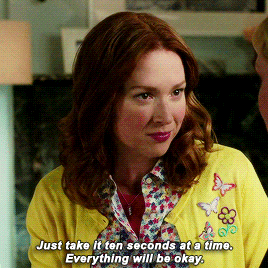Sleep is one of the hardest aspects of personal wellness to get right — not because it's actually hard, but because it's so, so easy to neglect. In a culture where we semi-glorify burnout, all-nighters, and 14-hour workdays, it's almost frowned upon to admit you got a full eight hours.
But sleep matters a lot. This recent study from the University of Mannheim in Germany describes how poor sleep quality can cause adverse effects on mental health and emotional well-being, work performance, and even how prone you are to accidents.The study identifies that one of the primary obstacles can be when you're lying awake in bed, staring at the ceiling and thinking. Sometimes you think about the mistakes you made that day — embarrassing gaffes at work, saying the wrong thing at the wrong time, or just going over stressful events. Feelings of shame don't only make it harder to fall asleep, they also reduce the quality of the sleep you do get.
But that's not the whole story. Our culture makes us pick up habits that we don't know are affecting our sleep quality, like checking our phones first thing in the morning and last thing at night, or neglecting to exercise. Often, it's not just a single factor that hampers you from sleeping well, but rather a whole set of choices throughout the day that end up keeping you awake at night and feeling less refreshed.
It's tempting to try to fix sleep issues by using prescription sleeping pills, booze, or other forms of self-medication. Indeed, insomnia is one of the leading causes of doctor's visits for American adults. But it's better to understand the causes at the root — lifestyle habits — and learn the best methods for addressing those.
Why Does a Lack of Self-Compassion Keep You from Resting Well?
The Mannheim study shows that stress reduces sleep quality through a number of mechanisms. Worrying about the past or future, stressing about how you said or did something wrong, all have a serious impact. Stress causes your brain to be running a million miles a minute, which is the worst thing you want before bed.
The issue is that this mindset is encouraged by a lot of our pre-bedtime habits. For example, although working out has been proven to decrease stress and improve sleep quality, many of us neglect it. And even though having devices in the bedroom is demonstrated to make it harder to get to sleep for various reasons, most of us are in the habit of having it on our nightstand, or even our hand as we try to fall asleep.
The upshot is that when right you're trying to switch off, everything you've done in the time leading up to your bedtime sends signals to your brain that you're still on. This results in you tossing and turning, staring up at your ceiling, and cursing yourself for being unable to switch off — which, of course, can actually stress you out more, leading to a vicious cycle.
This is where self-compassion rituals can help. Although ideally, we'd all be exercising an hour a day, with cell phones out of the bedroom and fully calmed in the pre-bedtime hour, a lot of us just don't have that luxury, or we want to start sleeping better now while we work on improving our habits overall. The study identifies two exercises involving self-compassion that help you fall asleep by decreasing stress.
How to Apply Self-Compassion Before Bedtime
A lot of us struggle to happen upon self-compassion by accident. We've been trained by society to be hard on ourselves, unforgiving of mistakes, and quick to remember errors we've made. This means that if you want to get to sleep easier, you have to be deliberate about self-compassion. You won't stumble into the state unintentionally — it takes intentional practice to get there.
One method the study recommends is using a set of three writing exercises, each of which identifies one of the three positive elements of self-compassion: self-kindness, common humanity, and mindfulness.
The first writing exercise, which promotes self-kindness, is simply to imagine what you'd say if a close friend of yours was having the same problems as you. Frequently, we're kinder to others than we are to ourselves, and this exercise serves to remind us of that — and prompts us to extend some of that kindness your own way.
The idea of common humanity is that you're not alone. The exercise to help identify a sense of common humanity asks you to objectively consider the feelings you're experiencing and be aware of the fact that good and bad things happen to all of us. For the problem you face, you should mark on a scale of one to ten whether it's exclusive to you (a one), or whether it's something everyone faces (a ten), or somewhere in between. You then do the same, but imagining it's a friend telling you the problem. Then, imagine someone you look up to. Do they make mistakes?
Finally, to practice mindfulness, think about your feelings again, and try to pick out on a scale how much the feeling is affecting you, from not mattering at all, to being almost overwhelming. The writing exercise asks you to remember that whatever the mistake is, it happened in the past. By mindfully assigning weight to the feelings, you're able to consider them in a more objective and less overwhelming way.
This exercise should take just 20 minutes, but it promotes self-kindness, common humanity, and a sense of mindfulness, all of which will help you be a bit more compassionate towards yourself and increase both the quantity and quality of your sleep.
Conclusion
Insomnia is a problem with a million causes, some within your control, some not, and some you don't even realize might be causing your inability to fall asleep. As we go through life, we collect good and bad habits that help us cope, perhaps not even realizing that they have adverse effects on our health and happiness.
Today's always-on lifestyles make it hard to get enough hours, even if you don't have issues falling asleep. What's more, you may be unwittingly blocking yourself from deriving the most replenishing benefits possible from the sleep you do get.
There's a whole laundry list of potential habits you could start changing or tweaking to see if they help. You can certainly work on incorporating an exercise routine, a mindfulness practice, and leaving devices out of the bedroom, all of which will help. But the next time you're lying awake in bed, desperate to just switch off but unable too, try some self-compassion. The written exercises outlined above can be extremely effective as a way to touch base with yourself, quickly address the issue, and start building healthier sleep habits, one step at a time.
This article was originally published on Medium.




 man running in forestPhoto by
man running in forestPhoto by 





 "I thought you knew what you signed up for."
"I thought you knew what you signed up for." man and woman in bathtub
Photo by
man and woman in bathtub
Photo by  four women sitting on black steel bench during daytime
Photo by
four women sitting on black steel bench during daytime
Photo by  Uber app ready to ride on a smartphone.
Photo by
Uber app ready to ride on a smartphone.
Photo by  woman in red tank top and blue denim shorts standing beside woman in black tank top
Photo by
woman in red tank top and blue denim shorts standing beside woman in black tank top
Photo by  blue marker on white printer paper
Photo by
blue marker on white printer paper
Photo by  welcome signage on focus photography
Photo by
welcome signage on focus photography
Photo by  woman in white and black striped long sleeve shirt lying on bed
Photo by
woman in white and black striped long sleeve shirt lying on bed
Photo by  pink pig coin bank on brown wooden table
Photo by
pink pig coin bank on brown wooden table
Photo by  person holding iPhone 6 turned on
Photo by
person holding iPhone 6 turned on
Photo by  person holding pencil near laptop computer
Photo by
person holding pencil near laptop computer
Photo by  person slicing vegetable
Photo by
person slicing vegetable
Photo by 
 woman covering mouth with sweater
Photo by
woman covering mouth with sweater
Photo by  person holding remote pointing at TV
Photo by
person holding remote pointing at TV
Photo by  a woman with her arms raised in a crowd of people
Photo by
a woman with her arms raised in a crowd of people
Photo by  "Shocked disbelief: '95% of the population is undateable?'"
"Shocked disbelief: '95% of the population is undateable?'"








